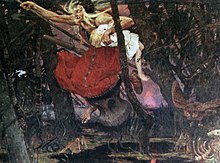Baba Yaga
Appearance
English
[edit]
Alternative forms
[edit]Etymology
[edit]Ultimately from Proto-Slavic *baba ęga (literally “hag of terror”), probably through Russian Ба́ба-Яга́ (Bába-Jagá).
Pronunciation
[edit]Proper noun
[edit]Baba Yaga
- (Slavic mythology) In Russian, Finno-Ugric, Polish and Bulgarian tales, a character who lives in a hut standing on chicken legs and who flies through the air in a mortar, using the pestle as a rudder.
- 2020, Ben Creed, City of Ghosts, London: Welbeck Publishing, →ISBN, page 143:
- [L]ooking like the hut, minus the fat chicken legs, of Baba Yaga, the old witch with iron teeth and an appetite for a human supper.
Translations
[edit]character in Slavic mythology who flies in a mortar
|
Portuguese
[edit]Alternative forms
[edit]Etymology
[edit]Ultimately from Proto-Slavic *baba ęga (literally “hag of terror”), probably through Russian Ба́ба-Яга́ (Bába-Jagá).
Pronunciation
[edit]
- Rhymes: -aɡɐ
Proper noun
[edit]a Baba Yaga f
Spanish
[edit]Alternative forms
[edit]Etymology
[edit]Ultimately from Proto-Slavic *baba ęga (literally “hag of terror”), probably through Russian Ба́ба-Яга́ (Bába-Jagá).
Pronunciation
[edit]
- Syllabification: Ba‧ba Ya‧ga
Proper noun
[edit]Baba Yaga f
Categories:
- English terms derived from Proto-Slavic
- English terms borrowed from Russian
- English terms derived from Russian
- English terms with IPA pronunciation
- Rhymes:English/ɑːɡə
- English lemmas
- English proper nouns
- English uncountable nouns
- English multiword terms
- en:Slavic mythology
- English terms with quotations
- en:Mythological figures
- en:Russian folklore
- Portuguese terms derived from Proto-Slavic
- Portuguese terms borrowed from Russian
- Portuguese terms derived from Russian
- Portuguese terms with IPA pronunciation
- Rhymes:Portuguese/aɡɐ
- Portuguese lemmas
- Portuguese proper nouns
- Portuguese multiword terms
- Portuguese terms spelled with Y
- Portuguese feminine nouns
- pt:Slavic mythology
- pt:Mythological figures
- Spanish terms derived from Proto-Slavic
- Spanish terms borrowed from Russian
- Spanish terms derived from Russian
- Spanish terms with IPA pronunciation
- Spanish lemmas
- Spanish proper nouns
- Spanish multiword terms
- Spanish feminine nouns
- es:Slavic mythology
- es:Mythological figures

